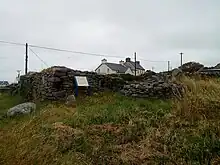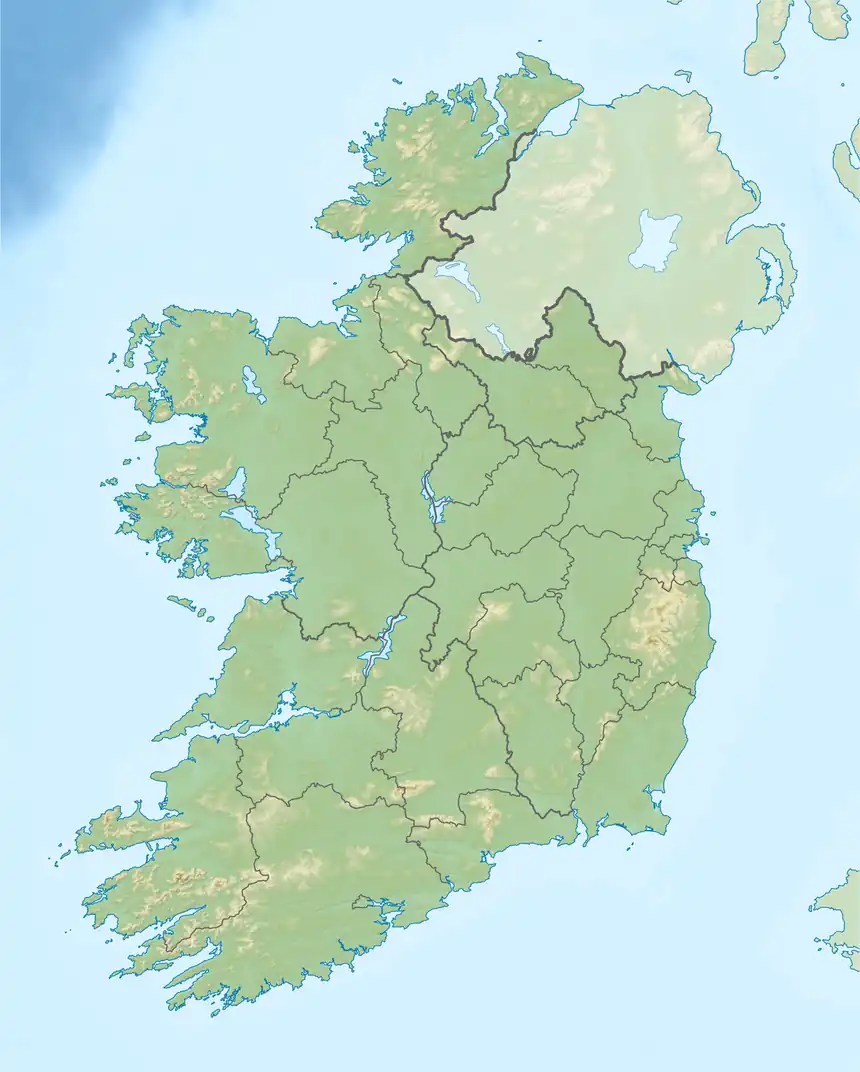| Templesaghtmacree | |||||||||
|---|---|---|---|---|---|---|---|---|---|
Teampall na Seacht Mac Rí[1] | |||||||||
 | |||||||||
 Templesaghtmacree | |||||||||
| 53°05′02″N 9°35′25″W / 53.083866°N 9.590158°W | |||||||||
| Location | Carrownlisheen, Inishmaan, County Galway | ||||||||
| Country | Ireland | ||||||||
| Denomination | Roman Catholic | ||||||||
| Architecture | |||||||||
| Functional status | inactive | ||||||||
| Years built | c. 8th–10th centuries AD | ||||||||
| Specifications | |||||||||
| Length | 10.85 m (35.6 ft) | ||||||||
| Width | 4.95 m (16.2 ft) | ||||||||
| Number of floors | 1 | ||||||||
| Floor area | 53.7 m2 (578 sq ft) | ||||||||
| Materials | limestone | ||||||||
| Administration | |||||||||
| Diocese | Tuam | ||||||||
| |||||||||
Templesaghtmacree is an Early Christian church and National Monument located on Inishmaan, Ireland.[2][3]
Location
Templesaghtmacree is located right in the centre of Inishmaan, the middle Aran Island. It is directly east of the modern Catholic church, the Church of Our Lady and St John.[4]
History
The name is derived from the Irish language, meaning "Church of the Seven King's Sons,"[5][6] commemorating seven men of royal birth who came to Inishmaan as hermits.[7] It was formerly a site of pilgrimage.[8]
Church
A rectangular stone church measuring 10.85 m (35.6 ft) by 4.95 m (16.2 ft), only the bases of the walls survive.[9] A doorway and window are in the south wall.[10][11] It also contains Leaba Cinndeirge ("Cinndeirg's bed"), a grave of an obscure female saint with a cross slab.[12] Tobar Cinndeirge, a holy well, is nearby.[13]
References
- ↑ "Teampall na Seacht Mac Rí/Templesaghtmacree". Logainm.ie.
- ↑ Harbison, Peter (27 May 1975). Guide to the national monuments in the Republic of Ireland: including a selection of other monuments not in state care. Gill & Macmillan – via Internet Archive.
Templesaghtmacree.
- ↑ "AN tORDÚ LOGAINMNEACHA (CEANTAIR GHAELTACHTA) 2011". irishstatutebook.ie. Retrieved 8 June 2020.
- ↑ "Catholic Church on Inis Meàin – Church of Our Lady and St John | How's the Serenity?".
- ↑ Spellissy, Sean (1 January 1999). The history of Galway. Celtic Bookshop. ISBN 9780953468331 – via Google Books.
- ↑ Britain), Automobile Association (Great; Beach, Russell (1 January 1976). AA touring guide to Ireland. AA. ISBN 9780091270209 – via Google Books.
- ↑ Unit, Curriculum Development (20 March 2017). The Aran Islands: At the Edge of the World. The O'Brien Press Ltd. ISBN 9781847179395 – via Google Books.
- ↑ Commons, Dylan. "Inis Meáin Island | Aran Islands Ferry | Doolin Ferry Co".
- ↑ "Inis Meáin (Inishmaan) – things to see & do -".
- ↑ Gosling, Paul (27 September 1993). Archaeological Inventory of County Galway: West Galway (including Connemara and the Aran Islands). Stationery Office. ISBN 9780707603223 – via Google Books.
- ↑ "Ireland". My Travels through Gaialand.
- ↑ Gosling, Paul (27 September 1993). Archaeological Inventory of County Galway: West Galway (including Connemara and the Aran Islands). Stationery Office. ISBN 9780707603223 – via Google Books.
- ↑ Halpin, Andrew; Newman, Conor (27 September 2006). Ireland: An Oxford Archaeological Guide to Sites from Earliest Times to AD 1600. Oxford University Press. p. 190 – via Internet Archive.
Teampall na Seacht Mac Rí.